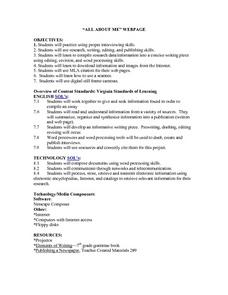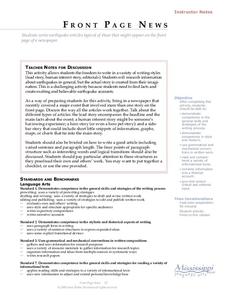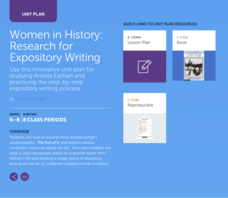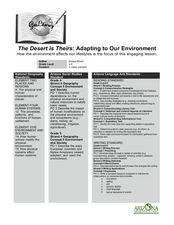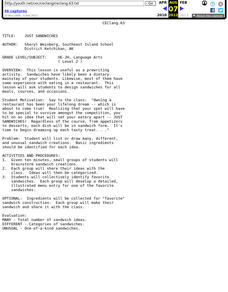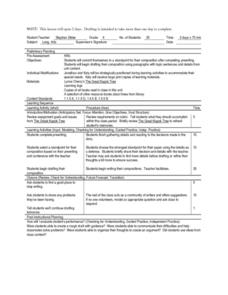Curated OER
"All About Me" Webpage
Students conduct interviews and write about the interview. The information from these interviews is used to create a webpage on Netscape Composer. Students cite Internet sources for any images downloaded from the web. Students also use...
Curated OER
Persuasive Elements
Investigate letters to the editor and their persuasive qualities. Break your class into reading groups and give each one a different article. As they read, they complete a graphic organizer to record their thoughts and opinions. There is...
Curated OER
Truly Amazing Mammals
Explore the world of amazing mammals with your kids with special needs. Each child identifies one mammal from a previous lesson and writes a short paragraph on that mammal. This lesson states that it is intended for all levels, but not...
Novelinks
The Cure: Guided Imagery
Prepare class members for a discussion of Sonia Levitin's dystopian novel The Cure, by leading them on a guided imagery exercise designed to encourage visualization of written descriptions.
Curated OER
Front Page News
Students write original earthquake articles typically found on the front page of a newspaper. Each student has the freedom to write in a variety of writing styles (lead story, human interest story, editorials, etc.). They research...
Curated OER
Drawing a "Life Map"
Students create an autobiography. In this writing lesson, students use a life map as a graphic organizer to develop their autobiography.
Curated OER
A Year (a Day or a Week) In My Life as a Shorebird
Learners describe the basic life history of one shorebird common to their area. They use the writing process which includes brainstorming, rough draft writing, peer editing, and re-writing to create a factually and grammatically...
Curated OER
What's the Matter? (Grade 3)
Third graders organize information about the three types of matter and to reinforce concepts learned in the matter unit of the science curriculum. They use Inspiration software to create a concept map of the three types of matter.
Curated OER
Pieces of Me
Eighth graders explore themselves and their community. For this writing lesson, 8th graders brainstorm ideas about their childhood, middle years, family, and future goals. Students write an autobiographical sketch about themlseves.
Curated OER
Women in History: Research for Expository Writing
After reading an excerpt from Amelia Earhart's autobiography, The Fun of It, learners explore various nonfiction resources about her life and write a short newspaper article on a specific event. They then develop a longer piece of...
Curated OER
Women's Right To Vote
Fifth graders explore the history of women's right to vote and identify two of the leaders of the suffrage movement, Alice Paul and Lucy Burns. After completing readings and discussions, they write an article for the newspaper about...
Curated OER
My Favorite Room
Young scholars practice describing a room. In this descriptive writing lesson plan, students use all of their five senses to describe their favorite room. The teacher will model for the class by creating a word list that describe the...
Curated OER
Story Starters
Sixth graders examine the pictures on a chart and relate to their own experiences. In this story starters writing lesson plan, 6th graders explore the pictures presented by the teacher and then create an original story based on the...
Curated OER
The Rest of the Story
Third graders make predictions about the story "The True Story of the Three Little Pigs" based on background knowledge. They read the story, stopping to verify or reject predictions. They write their own opinionated fairytales.
Curated OER
Autobiographies: A Jigsaw Puzzle
Students read The Autobiography of Ben Franklin. Using construction paper, they cut out five jigsaw puzzle pieces in different shapes using the entire sheet of paper. They write events from their own lives on the puzzle pieces, thus...
Curated OER
CREATE A NEW RHYME
Third graders develop basic narratives. They retell a focused story and create a basic publication using available resources (e.g., pictures, colors, computer, copier). They experiment with different forms of creative writing (e.g.,...
Curated OER
If I Could Have Lived in Another Time or Culture
Third graders develop multi-paragraph compositions. They include an introduction, first and second level support, and a conclusion. They use a variety of sentence structures (e.g., simple, compound/complex) and sentence types (i.e.,...
Curated OER
Picture the Process
Learners read Chasing Vermeer and relate the book to the author . In this writing process instructional activity, students view Blue's Photo Album and see how the author writes and revises her work. Learners discuss the process that all...
Curated OER
The Desert is Theirs: Adapting to Our Environment
Young scholars determine how animals and people adapt to the desert environment. In this desert lesson, students review vocabulary about the desert and how humans have to make changes to accommodate their environments. They listen to and...
Curated OER
Writing: Lesson 7
Teacher reads aloud to the students the material that is printed in boldface type inside the boxes. Information in regular type inside the boxes and all
information outside the boxes should not be read to the students. Possible
student...
Curated OER
Just Sandwiches
Second graders design sandwiches for all meals, courses, and occasions. They list or draw many, different, and unusual sandwich creations. Basic ingredients should be identified for each idea.
Curated OER
Paragraph
Fourth graders work through detailed steps to complete a paragraph on the story "The Great Kapok Tree." They gather details from the story, and choose a standpoint for the paper using the details as a defense. The students write their...
Curated OER
Getting Your "Hands-On" a Great Outline
Students write with controlled and/or subtle organization. They learn three ways to arrange a formal outline. Students demonstrate this knowledge by creating an outline as class. They cover the concepts of anticipation, investigation,...
Curated OER
Eloquent Speech
Second graders discover that oral and written communication can be improved, and made to sound more eloquent, when the following questions are addressed; Who? What? Where? When? Why? students use word processing to copy a poem using clip...


